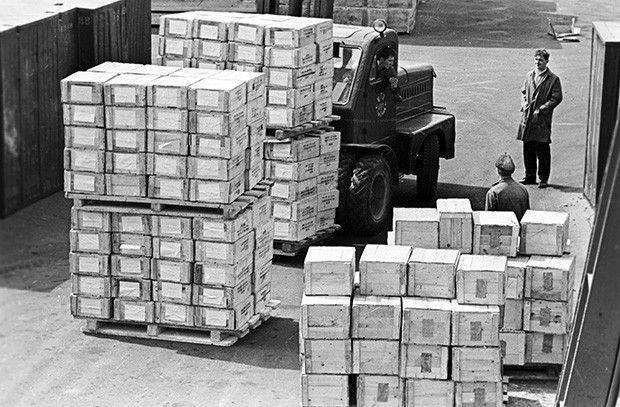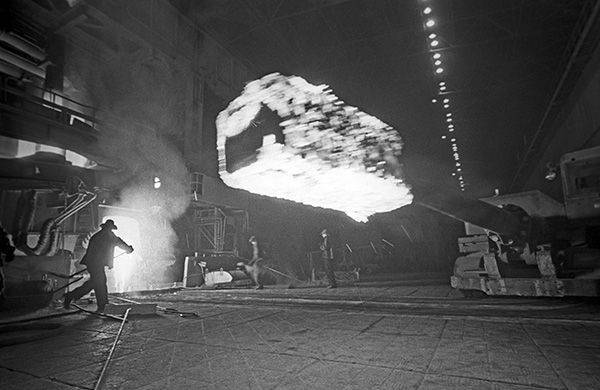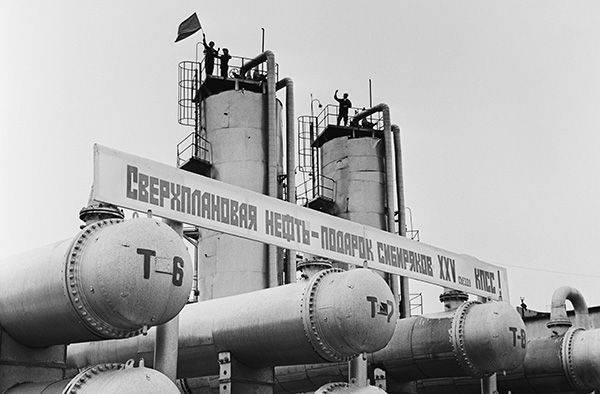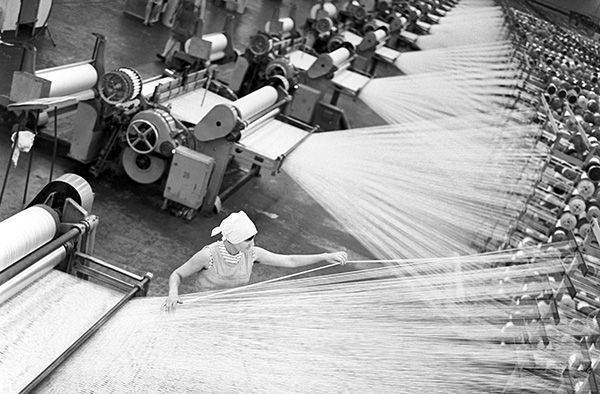Lessons from a single financial attack on the USSR

Russia is not the first time trying to break up by economic methods
Surface analysis of economics and stories - a huge misfortune for modern society. An article published by Bloomberg, “The fate of the Soviet Union will not befall Russia,” is a graphic confirmation of this. Moreover, which is typical, at first glance, the name is correct, and the facts are mentioned almost true, but here are the conclusions ... However, we will not run ahead, comparing to the authors of the mentioned material. Let us examine everything in order: what was the economy of the USSR in reality? Is it worth something to learn from her? And finally, what will really help Russia to avoid the fate of a state that no longer exists?
What was wrong in the USSR
According to the author (our compatriot with you, by the way), the USSR made only four serious mistakes. First, it depended unnecessarily on export earnings for oil. Secondly, too much of this very oil was supplied barter to partners in Eastern Europe and too little to Western countries for money. Thirdly, a huge proportion of the income received was spent on the purchase of grain due to the inefficiency of its own agriculture. Fourthly, the role of ideology and politics in the USSR turned out to be too high, which did not allow for timely and adequate response to all changes not only in the world, but also within the country itself.
Now Russia does not limit itself to ideology and therefore, it receives more money from the export of hydrocarbons, is less dependent on food imports and pursues a more pragmatic foreign and domestic economic policy, the author argues. And it turns out that all this is the result of the subjective decisions of one person. Putin decided that it would be beneficial for Russia to devalue the ruble, and, without hesitation, he did so, despite the negative consequences of this step for social programs and the living standards of citizens. This is, of course, better than the inaction of the Soviet leadership in the face of the global challenges of its time, but it is still a risky tactic, although it allows the country, thanks to the President’s determination, to hope to withstand the impending economic storm.
Familiar picture, right? Most of the domestic media has long been drawing us the same thing without prompting from American colleagues. With one difference, that credit is attributed not to the president, but to the Central Bank, which, by the way, makes decisions independently of the government. But that's not the point; the point is that both versions are very far from reality, but in reality everything looked very different.
Economy
We should start with the fact that, in principle, in the world there are no two identical economies. Although each country solves the same task - increasing its level of well-being, it has to do it in its own way, taking into account individual specifics. For example, Norway and Saudi Arabia have oil, and Switzerland or Gabon do not have it. Sudan is five times the size of Ukraine by territory, but at the same time it is several times inferior to it in terms of area and fertility of arable land. The capacity of China’s domestic market is much larger than in Belgium, as it exceeds it 130 times in terms of population. For these and hundreds of other parameters, each economy is almost a piece by piece and requires thoughtfulness and extreme caution when comparing.
The Soviet Union was no exception. And the matter is not even in ideology; Objective circumstances compelled the USSR to design its own unique economic model, which was very limited in terms of Western assessment rulers, especially in their modern interpretation. And the expression “Soviet economy” itself, to put it mildly, is incorrect, since its structure and indicators have changed greatly throughout the history of the USSR.
Between 1928 and 1940, the Soviet economy increased by more than 60%. If we consider that in the same years in the States, due to the Great Depression, the volume of GDP fell by 33%, the Soviet Union at that time was the world champion in that indicator. But then, as a result of the war, the country lost 25% of national wealth. 1700 cities and towns, 70 thousands of villages and villages, 32 thousands of plants and factories were partially or completely destroyed. After Churchill’s Fulton speech in 1946, which marked the beginning of the Cold War, the Soviet Union’s foreign trade with the West fell by 35%, which caused the economy a finishing blow. Naturally, about any primacy of speech was no longer going.
In fact, the Soviet economy, about which they like to speak today as something integral and unified from the moment of the formation of the Union and up to its last days, was re-created in the period from 1950 to 1975. This is not taken into account by a respected analyst speaking on behalf of Bloomberg. Like many others, he considers the performance of 1980-x - the beginning of 1990-x as a constant that characterizes the Soviet economy throughout its existence, and does not take into account the most important stages of its formation, at which time a number of strategic mistakes were made.
Disadvantages as a continuation of the merits
In 1964, the Deputy Chairman of the Council of Ministers of the USSR Dmitry Polyansky makes a report in which he speaks of clear evidence of the beginning of structural distortions in the Soviet economy. For seven years, its growth rate has halved. In industry, the share of unused fixed assets (or, more simply, idle production capacity) increased over the same period by 9%, and in agriculture, and even worse - by 21%! But most importantly, a fundamental imbalance between the so-called group A (heavy industry) and group B (light industry and consumer goods) was designated. The report noted that as far back as 1963, Group A doubled ahead of Group B in growth rates (10% per year versus 5%), as a result, in heavy industry, the USSR had 65% of the US figures, and in the light industry, only 45%.

Although formally it was then decided to catch up on both indicators, actually there was only one available resource, so the imbalance between them continued to increase in the future. As a result, this led to the formation of a serious shortage of consumer goods, which, in turn, began to affect the overall labor productivity. If in 1962, the productivity increase was 5,5%, then in 1964, only 4,2% was already, and by the middle of 1980-s it fell below 1%. This led to a progressive lag behind the planned deadlines, an increase in the volume of construction and production in progress and a drop in the efficiency of the economy as a whole. Because of only “unfinished business”, which by 1963 already became one and a half times more than it was in 1958, with every five-year period, there were less and less working capital in the economy because they were simply frozen because of “unfinished projects”. "And" underdevelopment. "
So the now popular theory that the United States destroyed the USSR due to the collapse of world oil prices is, frankly, quite far from the truth. Of course, a sudden deficit in the foreign trade budget played its negative role, but it turned out to be only the last straw that broke the back of an already overloaded camel.
Pro oil export and money
If you do not go into details, then, in general, the foreign trade of the USSR was distributed along two contours: the CMEA countries (Council for Mutual Economic Assistance) and the rest, above all the Western world. Despite a serious fall at the beginning of the Cold War, the foreign trade turnover of the Soviet Union subsequently grew steadily: so, from 1951 to 1975, its total volume increased 17,3 times. We traded with 115 countries, including 13 socialist, 76 developing and 26 industrialized (capitalist).
At the same time, it is completely wrong to say that inside the CMEA we traded barter, and with Western countries for money. Trade with the countries of the socialist camp was also conducted for money. They were called translated rubles and had a gold content (0,987 grams). The difference with the rest of the trade was that the bilateral clearing mechanism was widely used within the CMEA system, which required money only for the settlement of the reporting period, that is, only the difference between the total value of the goods exported and imported by a particular country was paid. And this trade has always been mutually beneficial. Each country used its own strengths and compensated its weaknesses. For example, agriculturally developed Hungary and Bulgaria supplied food to the USSR, and received transport and industrial equipment. And so on.
As for the high share of oil in Soviet exports, there is a certain amount of truth here. On the one hand, it cannot be said that the USSR was selling only oil or only raw materials. If you look at the structure of exports from 1950 to 1975, we see that the main commodity groups were, firstly, machinery and equipment (up to 18,7%), and secondly, ores, concentrates, metals and products from them (14,3%). But, on the other hand, high oil prices quickly brought the share of fuel and electricity in exports to 31,4%.

From here, by the way, the “imbalance” in the structure of industry “grows”. Group A brought the country the bulk of export earnings, and, oddly enough, it consumed almost half of all imports to the USSR (33,9% of foreign supplies accounted for machinery and equipment, that is, means of production, and 11,5% —– us types of ores and metals from them). Meanwhile, Group B clearly could not claim leadership in the export structure, and the deficit of its products was easily compensated by purchases abroad (for example, food occupied significant 23% of total imports, but only a third of the deliveries were carried out by the capitalist countries). Therefore, instead of investing in expanding its own agriculture, the USSR continued to invest in Group A and the basic infrastructure more and more. It was too expensive for one country to develop at an accelerated pace. The same BAM in 1984 prices of the year cost the country 9,6 billion rubles. For reference: all revenues from oil exports of the USSR in 1975 amounted to 7,5 billion rubles.
But something the Soviet leaders still missed. By the middle of the 1970-x in the hands of the capitalist countries, there were at once two very important for the Union "tap": oil exports, or rather the share that went to the West and brought the 1 / 3 to the USSR all of its foreign trade revenue, and grain imports, the main part which came from the USA and Canada and, accordingly, was paid by currency (the same foreign trade revenue).
How have we eaten
Someone clever at the CIA was able to correctly match the three points. First, the escalation of capital construction rates and the progressing volume of “unfinished business” will force the USSR to continue financing projects even in the face of a shortage of income. The long-term construction in the country turned into something like a bottomless barrel. Second, as the efficiency of domestic production declined, dependence on export revenues for oil became critical. Trade inside the CMEA provided the participants with the necessary goods and services, increased the level of production and consumption, but generated too little free money that could be invested in other projects. Thirdly, the occurrence of grain outages automatically attracted a decrease in the volume and productivity of the meat and dairy industry. The lack of shoes can somehow be experienced, but the shortage of food will be noticed immediately.
The plan worked. The fall in world oil prices has reduced the flow of free money into the Soviet economy even more. All three factors earned a minus. The USSR tried to compensate for the losses by increasing the volume of production and export of all the same oil, but it began to eat up the additional volume of the already deficient currency. And it would be okay if everything became catastrophically bad right away, at one moment. What then, that now we, perhaps, remain the best in the world in terms of the ability to mobilize in a critical situation. But, unfortunately, the decline of the economy was too slow. Therefore, the USSR did not get out: it created a feeling of only temporary difficulties that could be completely overcome. And the scale of the economy was too large to understand where the consequences of someone's personal carelessness are manifested, and where the system was knocked down by fundamental errors in the management strategy.
Serious help in the collapse of the Soviet economy was, for example, the fact that, for political reasons, the USSR distributed $ 130 to $ 160 billion loans to developing countries. This is roughly 21,97% of Soviet Union GDP for 1975 a year. When the country needed money, it was not possible to return almost anything from the loan.
The traditional imbalance between the level of production and consumption in different republics of the USSR made its own negative contribution to the situation. As early as in 1985, the RSFSR gave 15,5% of income to support its less productive neighbors in the Union, and by 1990, this share reached 32,5%. In addition to it, Belarus was a stable donor (on average, 25%) and in some years Kazakhstan (12,7%). All other regions have consistently lived beyond their means. Ukraine consumed 6,6% more than it produced itself. Uzbekistan spent three times more in 1989 than it earned. In 1990, Georgia consumed $ 41,9 thousand per person per year for its own production at $ 10,6 thousand. Stable high social imbalance was observed in the Baltic States. Consumption in Estonia exceeded domestic production by 1,68 times, in Latvia - by 1,63 times, in Lithuania - by 1,67 times. And they firmly believed that they had completely earned every penny of themselves. Having, say, in 1990, the volume of consumption per person is only $ 11,8 thousand per year (at production of $ 17,5 thousand) of the RSFSR looked like a beggar in the eyes of well-fed Latvians (consumption - $ 26,9 thousand, its own production - $ 16,5 thousand).

In short, the welfare of the rest of the country was provided by the donation of the economy of the RSFSR, and the impossibility of abandoning it for a number of reasons, including ideological ones, led to the continued consumption of resources.
Homework
As can be seen from the above, reducing the collapse of the Union only to the primitive “oil prices have fallen, so the USSR ran out of money” - it's like calling a mining truck an ordinary garden wheelbarrow. The point was not in the money itself, but in the strategic decisions underlying the design, and the principles of the functioning of the Soviet economy as a whole. In order not to step on the same rake a second time, you should learn some lessons.
First, ideology should not interfere with the economy. More precisely, political considerations are obliged to flow from economic with the obligatory preservation of full parity in relations. So far, an example of current relations with Ukraine shows that this lesson has been learned by the country's leadership. First the money, then the chairs.
Secondly, the country certainly needs Tanks, ballistic missiles, submarines and rolling mills, but heavy industry should still be developed while maintaining a balance with light, as the provision of housing, food and consumer goods is no less important than the balance of nuclear warheads. On this issue, in general, the situation is satisfactory. However, we need to actively develop the manufacturability of industry and manufactured goods in Russia. It is good that we have the world's largest sapphire crystal factory. But it would be nice for us to make smartphones, too. Not in order to be sure to own, but to prevent lagging in advanced technologies and for reasons of state security.
Third, food security is critical for Russia, especially in basic areas, including grain. An example of last year's harvest showed that without tough barrage measures in the form of export duties, the producers themselves still think about maximizing their own profits much more than about any other issues.
Fourthly, if we discard particulars and a beautiful wrapper, then it should be concluded that analysts from the CIA thrust the crowbar not just into the general Soviet economic mechanism, but delivered a well-adjusted, point strike to the most vulnerable spot. And the price of oil here is just a tool. The true purpose of the operation was the working capital of the entire economy of the country as a whole. Having lost them, she simply choked and collapsed under her own weight. However, since then, nothing much has changed. The goal of the current economic war is still finance, namely, circulating capital in the economy. Thus, we need to prevent its outflow, but at the same time maintain the provision of enterprises to them. At the moment, this is the most poorly learned lesson in Russia.
And, fifthly, it is necessary to stimulate the economic development of the regions and reduce, thereby, the gap in the standard of living in different parts of the country. Subsidized regions are a development resource that can and should support itself. Here you have the second poorly learned lesson from all of the above.
Well, three out of five is probably not that bad. But, you see, I would like to live on a five-point scale not only “satisfactorily”, but, in the end, at least “good.”
Information